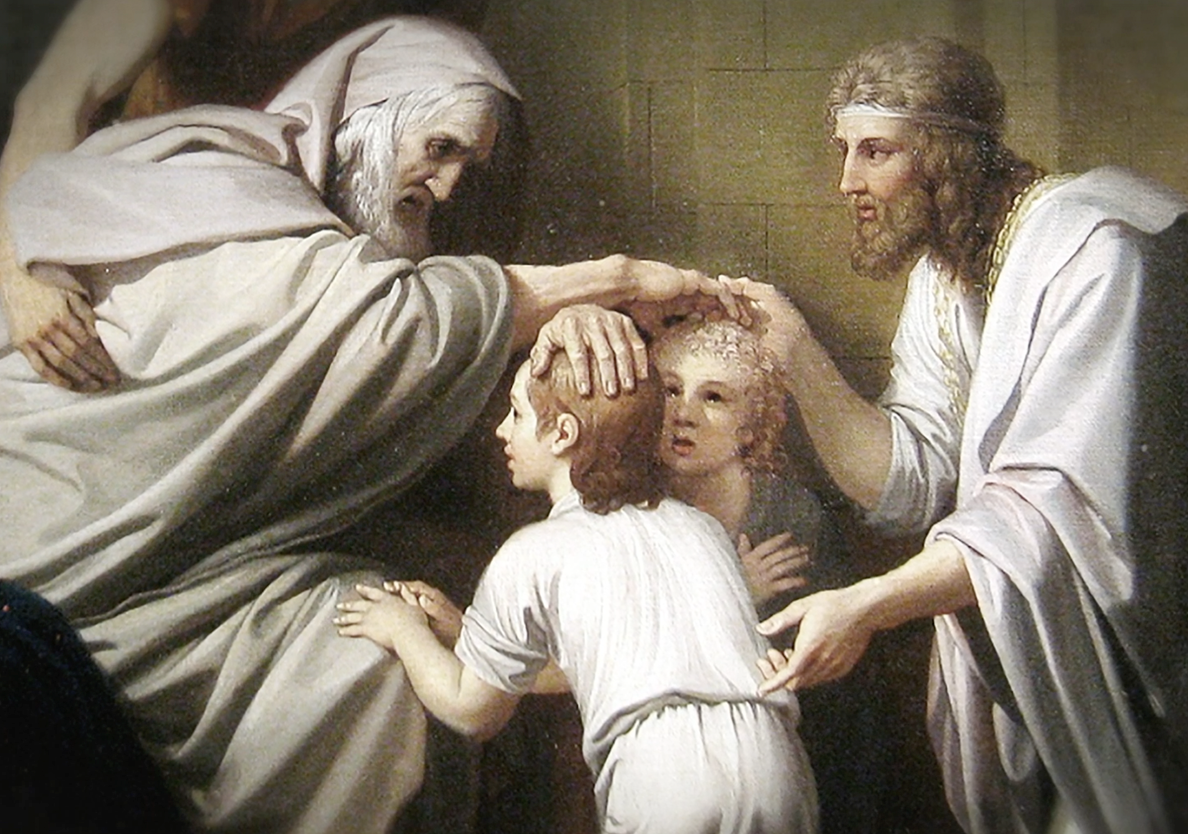In Part 1, I discussed the overarching perspective on the threshing floor scene I am arguing: that it is actually a redemptive scene. On the threshing floor, Boaz and Ruth model a path of behavior which eschews using sexual manipulation to get what they want. At the same time, the scene does not deny the reality that humans are sexual beings. In the last post, we looked at Naomi’s plan. She sends Ruth to the threshing floor with the apparent intention that Ruth use her sexuality to secure a better future for herself—to whatever extent that be necessary. We also examined the odd part about the feet in the whole plan. In this post, it remains to look at what Ruth and Boaz did. After examining the text and the canonical background, we will move to some application of this narrative. What stands to the fore here, I believe, is that sexual manipulation is not the only way.
Ruth and Boaz: getting things done at the threshing floor
Ruth goes down to the threshing floor and follows Naomi’s instructions to the “t.” As we read through the narrative, it is not immediately clear what she did when she “uncovered his feet and lay down” (3.7). That requires some close attention to what the text says.
Where Ruth lays
Verse 8 is important here. Boaz wakes up and rolls over, and only then is he aware that there is another person there—which he recognizes is a woman.
Note that it is not until Boaz moves that he is aware of Ruth’s presence, suggesting that Ruth is not touching him (at the least, Ruth is not actively attempting to seduce him). This shows that Ruth interprets “(place of the) feet” as laying on the ground somewhere other than on Boaz with the point of having sex. We can assume that she resumes this same position again after they talk, and that that is what Boaz means for her to do (3.13).
What Ruth does there
Beyond merely not trying to seduce Boaz before he wakes up, Ruth continues along this same course of action. Rather than trying to engage in sex, she talks to Boaz. Namely, she identifies herself and proposes marriage. Intriguingly, we are never told anything about what Ruth looks like. Other women in the OT are described by appearance—such as Rachel (Gen 29.17)—so there may be significance in this omission.
Ruth is known only through what she does; she is not reducible to a body. Her moment to shine is when she claims the identity of Ruth, your servant, but your servant who wishes to become your wife.
For readers with a strong sense of the Bible, Ruth’s actions are exactly opposite of what happened when Ruth’s great-foremother, Lot’s daughter, seduced her father in the cave (Gen 19.30-38). Ruth has the opportunity to get what she wants and needs by seducing Boaz, but instead she talks with him.
What Boaz does
Pulling on the hints in the text and the canonical background shows that Ruth performs marvelously. But what about Boaz? Here we see more of the same.
Boaz notices that a woman is lying there. His response is one of surprise. The real key, though, is what Boaz says. He asks, “Who are you?” When faced with an unknown woman in the dark, rather than assuming she is a prostitute rendering her services, he asks the all-important question. This question allows the two of them to figure out the right way to treat each other.
Again, for readers sensitive to the bigger story of the Bible, compare this to the way Boaz’s ancestor, Judah, acts in Gen 38. There, on seeing his daughter-in-law Tamar dressed as a prostitute at the side of the road, the first thing he says is, “Come, let me come in to you” (Gen 38.16), which is a euphemism for having sex. This sets up a discussion about the price for the tryst. By contrast, Boaz’s question indicates he does not presume to have a right to sexual access to the woman laying at his feet. Rather, he seeks to find out who she is so he knows the right way to treat her. How differently the life of Judah and Tamar would have gone if Judah had asked that same question in Genesis 38!
The “heated” discussion
Finally, the sexual tension largely fades away as Ruth and Boaz move into a discussion about the technicalities of marriage law. The depth of Boaz’s honesty in this passage is significant. He does not hide from Ruth—who apparently doesn’t know—that according to their laws there is another relative who has the first opportunity to marry her.
If it were Boaz’s main intention to have sex with Ruth on the threshing floor, this seems like an odd piece of information to share. In effect, Boaz both acknowledges Ruth’s proposal for marriage and at the same time distances himself from the ability to carry out the marriage at this instance. In terms of the “rights of sexual access,” Boaz is not the first one in line.
In making this point, Boaz effectively guards himself against any intentions Ruth may have had to try to have sex with him that night (whether she did or not is a moot point). Boaz tells her, “I will marry you, provided the other relative does not do so first.” This puts a tryst off the table for the evening.
Technical aside While it may sound odd to our ears, scholars of the Bible—and other cultures with similar practices—often talk about who has “sexual access” to a woman within the legal system of the culture. The default view of modern Western culture is that a woman can have sex with whoever she wants—though it is generally looked down upon for someone in an active relationship to have sex with someone other than their partner without consent. The default view of many non-Western cultures today (and of Western culture throughout most of its history), by contrast, is that there are clear limits on who a woman’s prospective sexual partners could be. Boaz alludes in this passage to the system called Levirate marriage (or to something like that system). The main point of relevance here is that, once a woman married into a particular family, the potential pool of future mates, in the event her husband died, was limited to specified kinsman of her husband. Who has “sexual access” to a woman is spelled out in the laws and customs of the culture. This whole way of thinking is rather foreign to us, but it is important in this text. By pointing to the other kinsman, Boaz is effectively saying that regardless of his or Ruth’s intentions, he does not have the right to sexual access at this point. For that to happen, he must first develop the clever legal scheme at the gate in chapter 4.
Summary
While the text itself does not come out and answer the question whether Ruth and Boaz “did” anything at the threshing floor, the hints in the text point to them sharing a chaste night. Both are cast as responding differently from their ancestors in Genesis. Rather than turning to sexual manipulation to get what they desire, they turn to talking, sharing dignity, and concern for what is proper under the law. In other words, both Ruth and Boaz reject sexual manipulation as the path to follow and engage in redemption. They redeem humanity one little bit from the well-trodden path of sexual trickery.
Against this backdrop, we can make some sense of why Boaz tells Ruth to lay back down rather than go home for the night. Now that they have worked out an appropriate way to relate to each other, the threat of something going wrong is much reduced. However, if Ruth is seen or caught making the journey back home in the dark, there could be major problems. At least if she is traveling home in the morning with grain, she can plausibly pass herself off as an industrious worker out and about early.
The threshing floor and today
Following this line of thinking, we are in position to let this text speak an appropriate word of judgment into our current life. Sexual manipulation and trickery are rampant today.
One thinks immediately of the #MeToo movement. #MeToo has brought to public light how pervasive sexual abuse. In answering the question, “who has sexual access to a woman,” many people answer “anyone with the power to take it.” The prevailing message in porn says the same thing: sex is about men taking what they want from women. By contrast, Boaz stands up in this story with a word of rebuke to our culture. Boaz’s question “who is it?” proves the noble and necessary response to the world of #MeToo and rampant pornography. This question, set within the bigger story of Scripture, shows awareness that the power and ability to take sexual access is different from the right to do so.
Ruth’s approach to the situation is admirable as well. The image of a woman using her sexuality to get what she wants is deeply engrained in Western popular culture: movies, TV, music, etc. Sexuality is considered a form of power to use in securing a desired end. Whether that end is the personal attention which the “if you’ve got it, flaunt it” philosophy of life seeks, or other goals, it makes no matter. Rather than try to manipulate Boaz with her sexuality, Ruth is open about her identity and her aims, trusting Boaz to act.
In the historical particulars, it would be foolish to try to reenact a Ruth and Boaz at the threshing floor kind of evening. However, read within the bigger story of Scripture, it sounds a welcome message for us today: sexual manipulation need not be the way to get what we want. The virtuous and upright choices of Ruth and Boaz lead to blessings and provision from God. By contrast, the stories of sexual manipulation—both in the Bible and again and again ever sense—are shot through and through with destruction and heart ache. There is a better way to walk. Ruth and Boaz model it.



